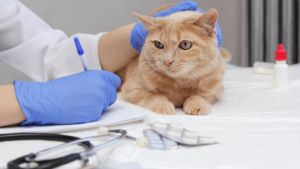My dog is constantly itching, what can I do?
Itchy skin, also known as pruritus, is an irritating and uncontrollable sensation that makes you want to scratch to relieve the feeling. My dog is constantly itching, what can I give him to relieve the itching?
In dogs, pruritus is manifested as compulsive licking, biting, and scratching. It is very frustrating for the dog but also for the dog owner. The itching will sometimes be so intense that the dog will actually cause himself serious wounds, and that by itself will cause secondary skin infections that become harder to treat.
I do understand the frustration and the need to find a quick fix relief, but you need to understand that in most cases putting an ointment will NOT solve the problem. The only solution is finding the cause and treating it. All the home remedies in the world will not help if the cause is, for example, fleas. Until you don’t apply the right product to eliminate the fleas, your dog will continue itching. The itching is a symptom and not a disease by itself, therefore it is important to understand the cause in order to find the right cure.
What then causes a dog to itch excessively?
Fleas
The first thing you need to make sure is that you protect your dog against parasites. You need to religiously apply once a month an antiparasitic spot-on or a collar that lasts for a few months. A lot of people underestimate this cause. If they don’t see the fleas, they believe they are not there. A frequent question – Why is my dog so itchy but has no fleas? Fleas do not always stay on the dog, they jump on him, have their meal (the dog’s blood), and go away.
Not only do you not always see them, but many dogs are also actually allergic to some components of the flea’s saliva. So just some “mild” encounter with a flea can cause a general allergic reaction that is perceived by the dog owner as “way more serious than just some parasites”. So the first thing you need to do when your dog starts itching continuously is to make sure you covered this topic.
Ticks
Another issue overlooked- thick transmitted disease. There are many and always increasing cases of disease transmitted by ticks. You only need one bite of a tick to transmit some very serious diseases that are not detectable immediately and quite difficult to cure. So here another major reason why you absolutely want to use a proper product.
Mange
Mange refers to skin diseases caused by different kinds of mites. They affect many kinds of animals, including humans. It’s a horrible, painful condition for dogs, they itch constantly, loose hair, skin covered in sores, or with thickened, hard, crusty patches. For that too you’ll need a particular product which you can only get with your vet’s prescription. This is another case where you have to have a diagnosis otherwise you might risk giving the wrong product and the symptoms will eventually worsen.
What if I applied the products but my dog is still itching?
The next thing we will consider is skin infections. These infections can be caused either by bacteria or fungus. Bacteria are a normal component of the skin, the problem is when the equilibrium is shifted and the proliferation gets out of control. Same for the fungus. For example, Malassezia is a fungus that normally resides on our skin and the dog’s skin, but when for some reason the immune system is not working properly, the fungus becomes a harmful agent. To have a diagnosis the vet will have to run some tests, the results will determine what kind of therapy is needed. In many cases, the therapy can be quite long- between 3 weeks to even 2 months, depends on the kind of infection.
Very often though, the skin infection is present but is not the primary cause, it is just a secondary infection, a consequence of the scratching biting, and licking. This continuous irritation of the skin will itself cause the component of the skin- the bacteria or fungus – to go out of balance and cause the infection. Either way, the infection needs to be treated.
What if I treat the infection but he still itches?
Now we are facing the most frustrating part of skin problems for all vets. We treated the parasites, we gave antibiotics for a month, we tested for fungus and nothing, now what?
Allergies
Unfortunately, very common in dogs, and not easy to find the cause of the allergy- the allergen. An allergy is basically an abnormal reaction of the immune system to an ordinarily harmless substance called an allergen. There are so many allergens such as dust mite, mold, and tree weed, and grass pollen- Ambiental allergens, as well as food allergens. There is an infinite number of allergens, and it is not easy to find which one is responsible for the allergy, even when performing allergy tests. Even if you do find the allergen it is mostly very difficult if not impossible to avoid absolute exposure to it.
Can I give my dog antihistamines?
Can Benadryl help my dog? Benadryl is diphenhydramine which is an antihistamine. The main mediator for an allergic reaction in humans is histamine, that is why antihistamines work best for our allergic reactions. While they work for us, don’t try to give it to dogs, they do not work. Their mediator for inflammation is a different one (mainly serotonin).
Depends if the allergy is seasonal or not, we will have a better idea about the type of allergy.
If your dog only itches at certain times of the year, we can assume it is related to ambient allergens. If itching occurs during the whole year, or when switching foods, we can assume it is food-related. Neither these are simple to analyze. The correct way would be an elimination test. That means the owner will have to follow a very strict diet eliminating all the food components of the dog’s usual diet and slowly introducing the elements, one by one, week by week, till revealing the allergy-causing ingredient. Unfortunately, this is not very practical as many owners do not find the time of the strictness necessary for such a procedure.
The next best thing is Hypoallergenic food. This food is processed in a chemical way to reduce the size of the potential allergens components (Proteins) so that the immune system will not react to them. There are many good foods out there and sometimes it is the only practical solution. Just remember that if you do follow this diet you should completely eliminate any other food, threat, anything. Otherwise, it is just useless!
Having tried all that and your dog is still itching?
Atopic dermatitis
The cause for the allergy is unknown and the only solution is to treat the symptom- the itching. In this case, your vet will prescribe you some medicine for relief. Cortisone works wonders but is not something you can give for a long period of time. It has many side effects and in the long term it affects the immune system and you become more vulnerable to other diseases. The other medicines will be either cyclosporine or oclacitinib.
There are also other causes for pruritus such as autoimmune disease. Although rare, they are more and more present in dogs. The treatment for these kinds of diseases is also immune system regulators.
Should I bathe my dog?
Dry skin
Another very important thing overlooked by many pet owners is over bathing. It is understandable that if your dog smells you’ll want to wash him. You think you are doing something positive but in reality, it is more harmful than beneficial. You do not need to wash your dog often, especially not with shampoo. I always recommend to not wash him more than once every 6 months. What it mostly causes is dry skin. And if you ever experienced dry skin you know how itchy it can get. Dogs have very sensitive skin, and most shampoos are too harsh for their skin. When you do wash him make sure it’s with a good quality shampoo bought in the pharmacy and not in the supermarket.
Dog itchy skin home remedy– Can coconut oil really relieve my dog’s itchy skin?
Well, as we said, we first need to find the cause. Coconut is rich in lauric acid, a healthful fatty acid that has anti-inflammatory, anti-fungal, and anti-bacterial properties. It does calm inflammation or dry skin, but it also really depends on the degree and severity of the itching. So let’s say you’ve washed your dog with some harsh shampoo, in that case, it can definitely help the itching. It is also a good idea to apply while you are also treating with a general antibiotic given orally, so you can immediately give some relief. Also very helpful – after insect bites, mild skin cuts, etc. By itself, coconut oil will not cure allergies, severe infections, parasite infestation, autoimmune diseases.
What about apple vinegar?
The same as for coconut oil, depends on the severity of the itching.
Apple cider vinegar is mostly made from fermented apples with the addition of yeast and sugar. It does help to soothe itchy skin. But more than that, it is an excellent product to wash your dog with if you want to eliminate odors. You can also put the solution into a spray bottle and spritz it onto your dog regularly which may improve skin and coat quality. It has also some insect repellent qualities, but I would not replace the proper anti-parasitic product with vinegar.
The same goes for all other natural remedies or home remedies like baking soda, aloe vera, and more. While they have good healing properties, at a maintenance level, when the dog owner is already looking for a remedy, it normally means the itching has passed beyond the initially mild phase.
What can I do to prevent my dog from itching?
Like any other unwanted condition- it is better and easier to prevent than to cure. When a symptom occurs it is merely a signal from our body that something has gone out of balance. There is always a reason why an animal gets sick, and there are some fundamentals for good health that should never be neglected. These are Emotions– well being, Diet– Quality and quantity, ambient– clean, pleasant.
Always make sure your dog gets the best food you can afford, if industrial then get the best one that has all the nutrients vitamins, and minerals. That should include good amounts of omega 3 as well. With good quality food, ideally, you should not add any supplements. If you cook for your dog talk to a vet nutritionist before for a proper diet accustomed to your dog. Avoid treats, these are practically junk food for dogs. As a treat just give him another type of wet food- good quality as well- just different so he’ll think it’s a treat. For most dogs, it doesn’t take that much to make them happy with food.
On the emotional level, don’t neglect his need, show him love and affection. Make often long walks, get him some toys, don’t leave him to long by himself- if you are not home often, pay someone to spend some time with him. Dogs need company. Very often excessive licking (especially his paws) is caused by boredom or stress from separation.
For the ambient- make sure it’s clean, warm, safe. Basically, try to meet his needs as best as you can. An extra dollar on prevention can save you thousands on therapy and intervention.
As you can see this is not a simple “put some cream and it will go away” situation. You need a proper veterinarian visit and diagnosis. In the meanwhile, what you can do at home, is all the prevention we talk about, antiparasitic product, and keep him from scratching- it will only aggravate the situation. You can stop him from scratching by applying an Elizabethan collar, for now, but don’t stop there, the itching is still there.
Let me know your thought, your doubts, if you have any questions, some topics I did not cover, please let me know 🙂




